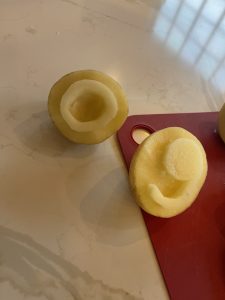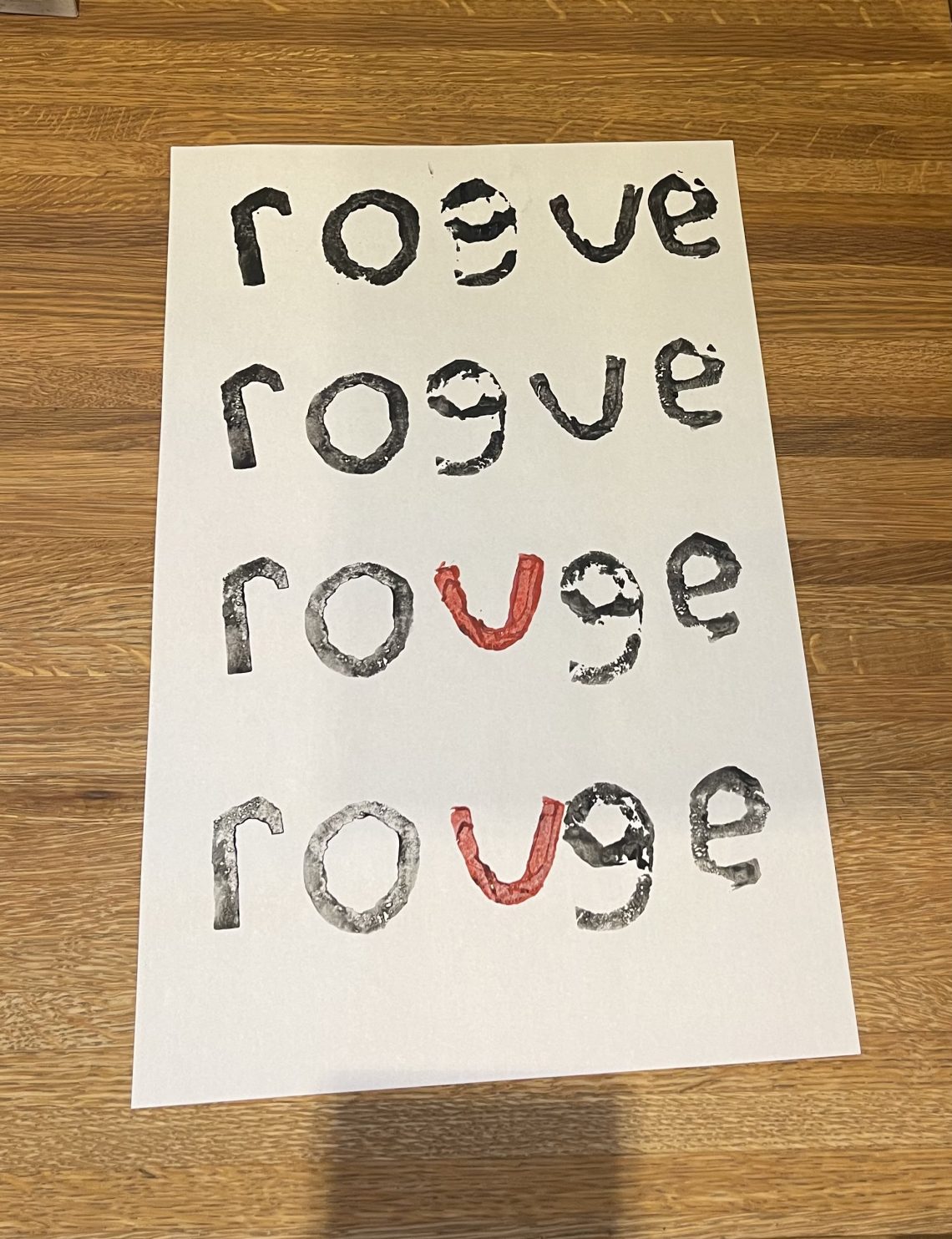




I chose to work on this week’s task with my daughter as she loves a craft, so I included her in the process of creating the stamps. The first step was picking a word. There is a reason that Wordle is so popular and also difficult. There are so many 5 letter words in the English language. As I scrolled the options, I was not looking for a word with specific letters, but wanted a word that stood out to me because of the meaning. Rogue caught my eye right away. Webster’s dictionary states: to go rogue is to begin to behave in an independent or uncontrolled way that is not authorized, normal, or expected, but a second definition given is that it can refer to a dishonest person or a scoundrel. Today, when someone goes against the norm or thinks outside the box, they would be considered to have gone rogue. It has a positive connotation in some ways. Historically, the term would have been associated with the second definition of the word, which is not thought of in such positive ways. Word choice is important, and when examining the historical process of putting words on paper like we did when listening to the podcast this week, it put into perspective the laborious task to record words on paper. Robert Lamb and Jim McCormick talk about the value of the written word for making connections, disseminating information and possibly the most valuable ability, an extension of the human mind.
With this background information, I reflect on my ability to put down my word choice on paper, without my standard pen or computer to work with. I did not find the process especially challenging, except when watching my 10 year old daughter wield a knife, which made me a bit nervous. She enjoyed the process so much she made additional stamps to work with on her own. I had to forgo outlining a letter shape on the potato, as I could not find anything that would show up, so we had to freehand our letters. You will notice I included multiple images of the stamp collection, as I hit a snag in forgetting to reverse the letters, (even after watching the letterpress film). Thankfully, before paint went on I caught my mistake. You should also observe that I have a second word included. My daughter, noticed the letter combination, and because she is in French Immersion, her first thought when looking at the letters was the French word for red, rouge. Because of her insight, I decided to include it on the paper, just the subtle switch of two letters and we have a whole new word in a different language. I went with lowercase letters, but it was an unconscious choice as I am not sure capital letters would have changed the difficulty. When pressing out the letter, I had more difficulty with the even pressure on the g and e, and the only reason I could see was perhaps they are less compact than the others. My daughter and I accomplished this task in just over 30 minutes, but in when you put it in perspective, we only created one word in 30 minutes and this post has 568 words, many of which are longer than 5 letters. I am glad I don’t have to stamp my reflection as well. I would have been thankful there are only 26 letters in the alphabet.
References
Lamb, R & McCormick, J. (Hosts). (2010-present) Stuff To Blow Your Mind “From the Vault: Invention of the Book”, Part 1 and 2. https://www.iheart.com/podcast/stuff-to-blow-your-mind-21123915/








erin duchesne
June 13, 2022 — 3:27 pm
Hi Marie,
Your letters turned out really nicely- and not backward like mine! I interpreted the task as putting the whole word on one potato, but I think this way works better because now you can mix and match to make other words like a real printing press.
Jocelyn Chan
June 16, 2022 — 7:22 pm
Hi Marie, I love that you and your daughter used red paint for the ‘u’ in ‘rouge’. I’m reminded of the quote attributed to Henri Matisse, “A thimbleful of red is redder than a bucketful” (PrintMag, 2014). It also makes me think of ROGUE on Broadway in Vancouver (https://www.google.com/maps/@49.2633206,-123.117708,3a,75y,197.67h,82.99t/data=!3m7!1e1!3m5!1sy_KuUAyYKrtcKbhTgod36Q!2e0!6shttps:%2F%2Fstreetviewpixels-pa.googleapis.com%2Fv1%2Fthumbnail%3Fpanoid%3Dy_KuUAyYKrtcKbhTgod36Q%26cb_client%3Dmaps_sv.tactile.gps%26w%3D203%26h%3D100%26yaw%3D155.36615%26pitch%3D0%26thumbfov%3D100!7i16384!8i8192) — I keep wanting to pronounce it “rouge” every time I see the sign!
I didn’t realize how similar the lowercase letters for ‘e’ and ‘g’ looked until the photo of your stamps. Interesting!
You mentioned that g and e in your word were a little more challenging to stamp. Was there also a specific letter that was more challenging to carve?
References
PrintMag. (2014, July 29). Hotheaded quotes about color: Part 2. PRINT. https://www.printmag.com/color-design/hotheaded-quotes-about-color-part-2/
EmilyMacDougall
July 19, 2022 — 7:26 am
I completed this task with my kids as well and we had a blast! I love your word choice – it must have been challenging to use a word that has so many curved letters!